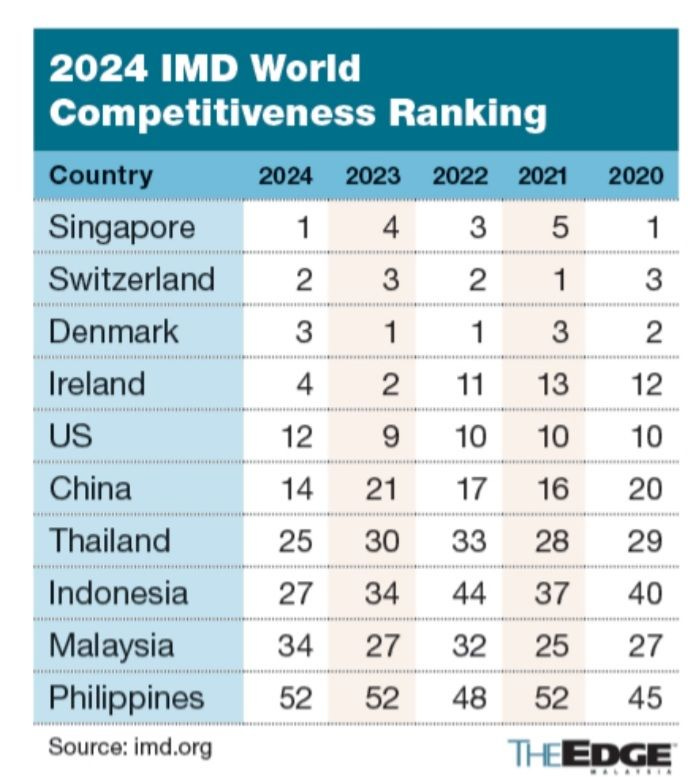With state of nation slacking in competitive edge compared to rivals like Singapore, Thailand and even Indonesia owing to deficiency in research and development, (since 2020, the Malaysian government's spending on R&D has remained constant at around one percent of GDP; Singapore 1.9%, China 2.24%, Taiwan 4%, South Korea 5.21%), that is, the socialisation of labour through integration of science and technology into the productive process is low. Then, there are palled policies to boost business performance owing to delayed institutional reforms, and the slow progress to maximise workforce productivity, (see STORM June 2023, industry 4.0 initiative, with non-optimal STEM education and insufficiency in vocational training of the work force. Further, policy and regulation ehancements are inadequate to improve and support global competitiveness within an evolving yet dynamic geopolitical environment.
The country still has much to pulsate forward. The Madani Economic Model is slow pacing towards a Structural Institutional Reform for Economic Development (SIRED), whence the PRAXIS on its implementation is still regarded as ineffective towards a TAPAO to wrap up the laggard legacy development process on the targetted areas poverty alleviation objectives.
The just initiated National Semiconductor Strategy where digitalisation is etched with a class contradiction, and the recent upsurge in property sales to Global North infrastructural platform monopoly-capital players only accentuated the dire straits of financialisation capitalism that not only straitjacketed the national economic development advancement as a resultant of deepened neoimperialism penetration (read also Prabhat Patnaik Global Diffusion of Production and the Concept of Imperialism; Vijay Prashad, Hyper-Imperialism - A Dangerous Decadent New Stage), but also widened the acceptance of neoliberal economic policies whence succeeding ruling regimes - under coverage of racial-bias directives supportive of ethnocapital-ethnocratic-clientel-capitalism - cater and care for Big Business interests over SMEs (small manufacturing enterprises) and in the process over-riding common rakyat² aspirations not unlike composition of neo-apartheidism.
For a historical perspective, browse through STORM March 2021 when, from the beginning of British colonialism to our present ruling regimes of using clientel-capitalism to colonialise the minds of the unrepresented destitutes in order to retain and sustain political power, immiserising countless rakyat2 land-settleless, and to continue impoverishing the poors (where the padi industry oppresses smallholders to the advantage of the rice cartels and monopolies or Big Farms { video +41-minute } confiscating Small Farmers’ land) in order for capitalism, specifically an established class of clientel ethnocratic capital – with political fabrication and economic entrenchment of the NEP construct (James Chin, 2016) which is clearly divisive to the nation’s unity and sense of belonging (Lim Teck Ghee) – to exist, permeate and flourish.
A good society must be marked by three attributes: social ownership of the means of production, social production controlled by workers, and satisfaction of communal needs and purposes.
We may still a long way to go on a path towards a socialist ideal.
However, a revival of Puthucheary's ownership and control of the national economy is duly and definitively requiring a visit; see his other articles HERE1 and HERE2.
The week that was with these postings:
1] Temperature rise unprecedented, Climate and Capitalism;
2] Overcapacity affecting high-tech industries, Lu Feng;
3] Colombian coal will not fuel Israeli genocide, Progressive International;
4] DINA -creation of the Dirección de Inteligencia Nacional, National Security Archive;
5] G7's Aid and the capital financialisation of Ukraine's war-economy, STORM;
6] MOMENTUM #204, and the
Terima kasih for visiting this site to read my postings On Geoeconomics.
Please share these blogs and essays with your kawan², diaspora² and komuniti sosial.
in solidarity,




